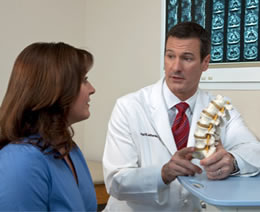Choosing a Spine Surgeon
 If you are facing the possibility of spine surgery, it can be intimidating and confusing. There are many decisions to make: should I have surgery, what type of surgery should I have, which spine surgeon should I choose?
If you are facing the possibility of spine surgery, it can be intimidating and confusing. There are many decisions to make: should I have surgery, what type of surgery should I have, which spine surgeon should I choose?
If you are exploring the option of spine surgery, verify that your surgeon has completed a residency in either orthopaedic surgery or neurosurgery and is certified by either the American Board of Orthopaedic Surgery or the American Board of Neurological Surgery. Physicians who are board certified in anesthesiology or pain management may be appropriately trained to perform spinal injections, but unless they have completed a residency in orthopaedic surgery or neurosurgery, they are not qualified to perform spine surgery.
In one state, an anesthesiologist had his medical license suspended for performing spinal surgery without proper training. See this article.
SHOULD I CHOOSE A NEUROSURGEON OR AN ORTHOPAEDIC SPINE SURGEON?
Orthopaedic spine surgeons and neurosurgeons are equally qualified to perform most types of spine surgery. Both perform cervical, thoracic, and lumbar surgery, including spinal cord and nerve decompression, spinal fusion, microsurgery and minimally-invasive spine surgery.
Both types of surgeons complete four years of medical school before entering a residency in their specific field. Traditionally, orthopaedic surgeons complete five years of residency training in the diagnosis and treatment of all musculoskeletal (bone, joint, muscle and nerve) disorders including those of the spine, whereas neurosurgeons complete residency training in disorders of the brain and spine.
Many spine surgeons will complete additional training in spine surgery after their residency called a fellowship. A fellowship involves more specialized training in advanced spinal surgery techniques including spinal fusion, minimally invasive spine surgery, and complex spinal reconstruction.
WHAT ELSE SHOULD I LOOK FOR IN A SPINE SURGEON?
Many patients choose surgeons based on recommendations of their friends, family or primary care physicians. This is a good way to have an idea about your surgeon’s treatment outcomes as well as how he relates to patients. If your relative or friend has had a good experience, then you will likely have a good experience. It is always important to understand that everyone’s problem is different, and each body responds uniquely to a procedure, so your experience will never exactly mirror that of another person.
Beyond that, it is important to ask a surgeon how many similar procedures he or she performs each month or year and the success rate he or she expects, what his or her infection or complication rate has been and, if you are interested, whether you could speak to a patient who has undergone this procedure. None of these questions should offend your surgeon.
Many patients seek a second opinion prior to surgery. This decision is personal and should not offend your surgeon. Most surgeons will be happy to have their patients get another opinion. Keep in mind that not all surgeons will agree on the precise type of procedure that is best, and the difference in opinions may be a source of confusion for the patient, but usually, discussing these options with your treating surgeon will be helpful in deciding the best course of action. Be sure to take your imaging studies with you for a second opinion.
QUESTIONS TO ASK ABOUT YOUR SPINE SURGEON
- Is the spine surgeon board certified by the American Board of Orthopaedic Surgery or the American Board of Neurological Surgery?
- Has the spine surgeon completed a one-year fellowship in spine surgery?
- Is the spine surgeon part of a multidisciplinary spine center?
- Is the spine surgeon trained in microsurgery and other minimally invasive techniques?
- Is spine surgery a big part of the surgeon’s practice, or is he or she more of a general orthopaedic surgeon or neurosurgeon?
QUESTIONS TO ASK YOURSELF AFTER SEEING THE SPINE SURGEON
- Did the surgeon fully explain the diagnosis and cause of your pain?
- Did the surgeon offer a full range of treatment choices or immediately discuss surgical treatment?
- Often you may still have several non-surgical care alternatives available, which may help you avoid unnecessary surgery.
- Do you feel comfortable with the surgeon and feel that all of your questions have been satisfactorily addressed?